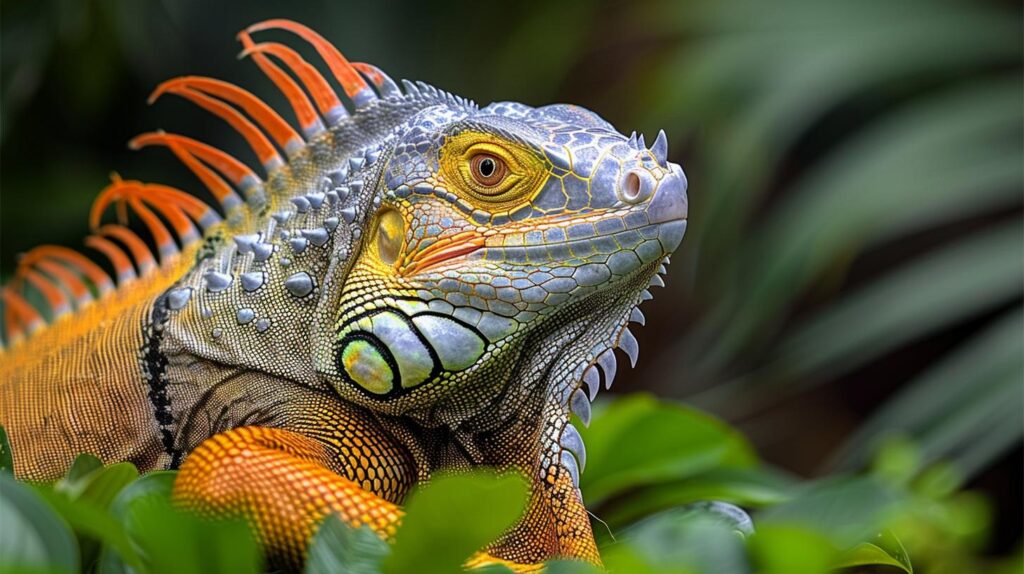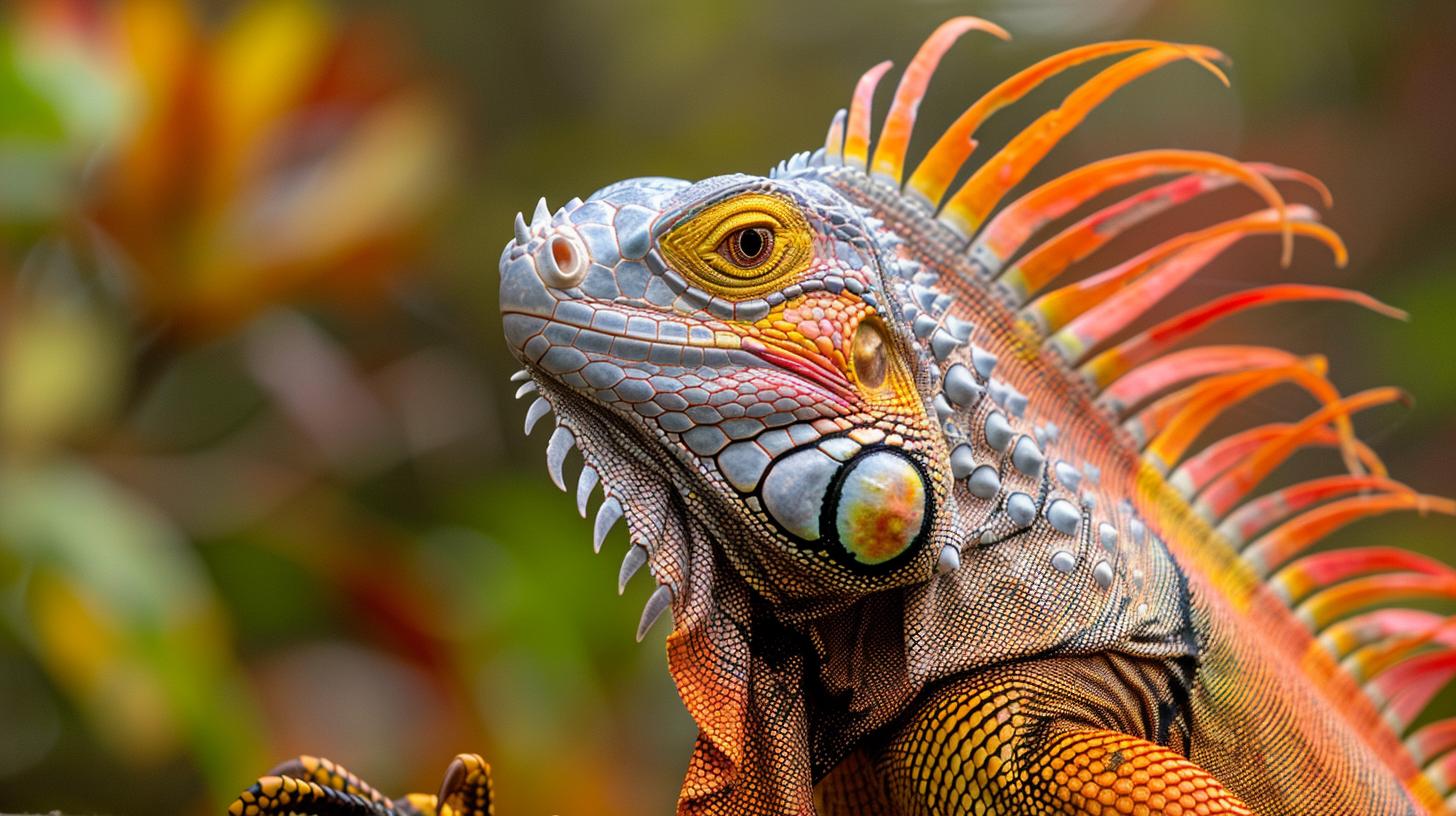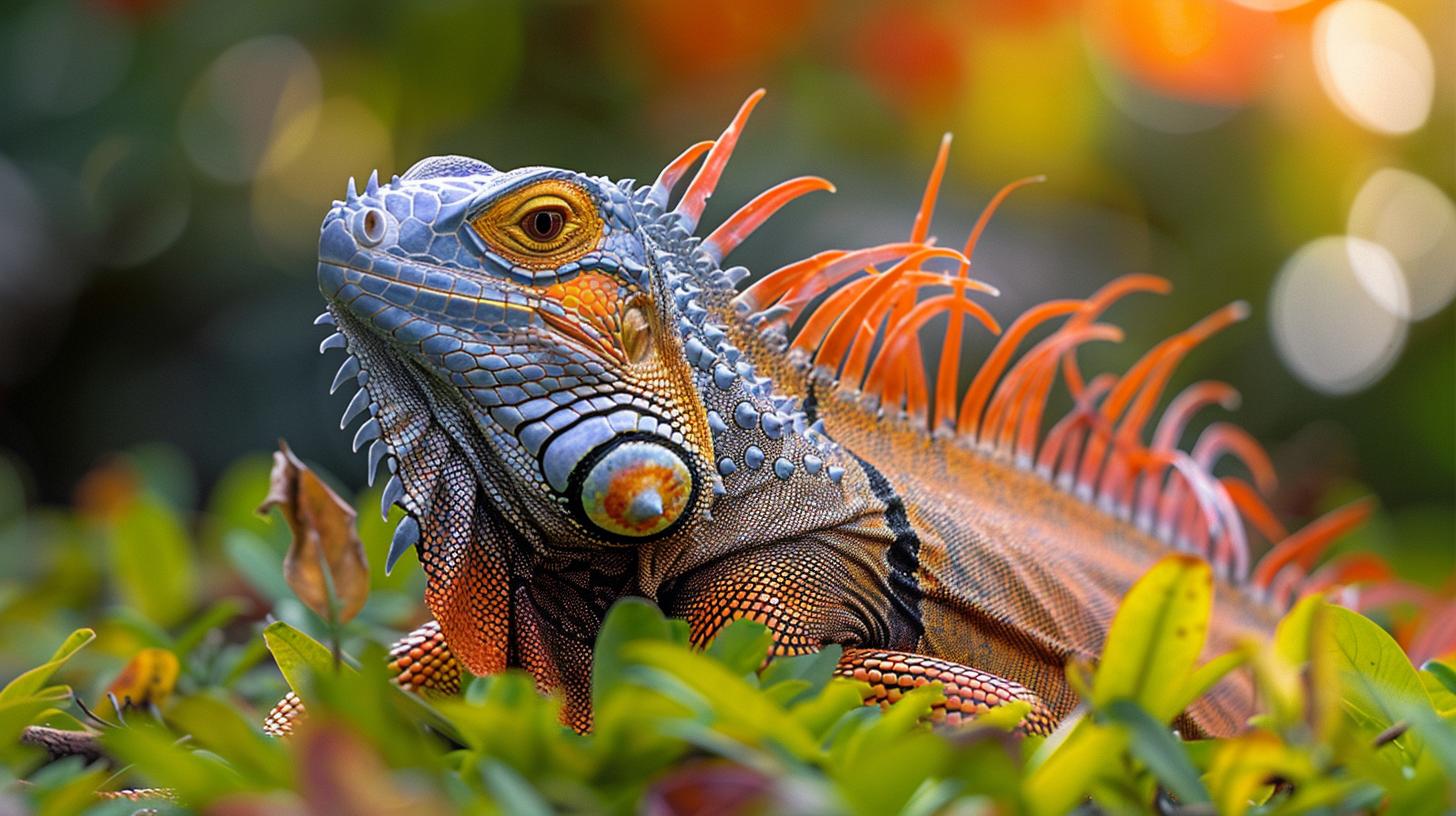Why Feed Iguanas These Safe Fruits and Veggies?

Understanding Iguanas
Navigating the world of iguana feeding can be akin to learning a new language. Essential from the outset is a comprehensive iguana feeding guide, serving as your roadmap to understanding not only what these majestic creatures enjoy eating but also what keeps them thriving.
The first step in this journey unfolds with a deep dive into the essence of iguanas - from their ancestral roots in lush forests to being beloved members of our homes. This initial exploration lays the foundation for grasping their dietary preferences and nutritional needs.
Iguanas, often hailed from Central and South America, have adapted over millions of years to consume a diet abundant in foliage. Among pet enthusiasts, species like the Green Iguana are commonly preferred, attributed to their docile nature and vibrant colors. However, it's not just about aesthetics; understanding these reptiles' dietary habits is vital.
They're herbivores by nature but providing them with just any fruit or veggie won't suffice; a balanced diet is paramount. This balance is crucial for supplying necessary vitamins and minerals that bolster an iguana's health, preventing common issues like metabolic bone disease.
The emphasis on a diverse diet stands as the cornerstone of our discussion. For iguanas, variety isn't simply about flavor but ensuring they receive a holistic array of nutrients critical for their development and longevity. Vitamins such as calcium and D3 aren't merely supplements but essentials that guard against health pitfalls while promoting robust growth and vitality.
As we delve further, highlighting safe fruits and vegetables becomes imperative in crafting diets that mirror their natural intake yet cater to domesticated settings. Through this lens, one begins to appreciate not only the dietary requirements of these splendid creatures but also how proper nutrition acts as preventive medicine, ensuring our scaly companions lead long and fulfilling lives.
The Importance of a Balanced Diet for Iguanas
A balanced diet is foundational to the health and longevity of iguanas. These herbivorous reptiles flourish on a varied diet rich in fruits, vegetables, and certain supplements to mimic the nutrient spectrum they would naturally encounter in the wild.
Understanding the dietary needs and restrictions of your iguana is pivotal in preventing common health issues such as metabolic bone disease, which can arise from nutritional imbalance. The right balance of calcium, phosphorus, vitamins, and water not only supports their physical wellbeing but also impacts their behavior and vitality.
As pet owners dive into the world of iguana care, recognizing the role of each food group becomes an essential part of their routine. A meticulous approach to an iguana's diet underscores the prevention of nutritional deficiencies and ensures that these captivating creatures enjoy a robust life. This section will explore why a meticulously curated diet stands as a cornerstone of iguana health maintenance.
Nutritional Needs: More Than Just Food
Iguanas have specific nutritional needs that are met through a carefully selected variety of foods. It's not just about providing meals; it's about offering a spectrum of nutrients essential for their growth and health. Vitamins such as Vitamin D3 are crucial in aiding calcium absorption, vital for strong bones and preventing metabolic disorders.
Similarly, vitamin C boosts immune system function, while fiber plays a significant role in digestion. Balancing these needs doesn't just prevent illnesses but also promotes overall vitality and longevity in iguanas.
Hydration: The Underrated Nutrient
While discussing an iguana feeding guide, hydration remarkably stands out as an integral component often overshadowed by focus on solid foods. Hydration aids in digestion and is paramount for kidney function - organs that work overtime given an iguana's plant-heavy diet. Freshwater should be readily available, alongside moisture-rich vegetables that contribute significantly to their daily water intake. This dual approach ensures that iguanas remain adequately hydrated, further enhancing their dietary balance.
The Core Benefits: Beyond Health
A balanced diet does more than just cater to physical health; it significantly impacts the mental well-being of iguanas too. Proper nutrition has been shown to influence behavioral aspects positively - reducing stress levels and increasing activity. Iguanas thriving on suitable diets exhibit brighter skin colors-a sign reflecting good health and proper care practices. A thoughtfully curated menu also diminishes the risk of obesity by aligning with their natural feeding rhythms-fostering both metabolic efficiency & emotional contentment.
In summary, offering your pet iguana a well-rounded diet replete with necessary vitamins, minerals, adequate hydration, alongside mindful integration of safe fruits & vegetables delineates your dedication towards ensuring not only their survival but fruitful flourishing under your care.
Safe Fruits for Your Iguana
As pet owners dive into the world of *iguana care*, understanding the optimal dietary choices becomes paramount. Iguanas, with their unique nutritional requirements, thrive on a diet rich in fruits and vegetables. However, not all fruits are created equal when it comes to feeding these reptiles. This section outlines several safe fruits that can be beneficial additions to your iguana's diet, playing a crucial role in their overall health and vitality.
Iguanas naturally seek variety in their diet, which should mimic the diverse range of foliage and occasional fruits they would consume in the wild. Safe fruits like papaya, mango, and berries offer essential vitamins and minerals that support an iguana's immune system and organ function.
For instance, papayas are not only a delicious treat for iguanas but also provide a significant source of Vitamin C and digestive enzymes, which can aid in their overall digestion process. It is important to integrate these fruits into an iguana feeding guide carefully, ensuring they complement the primary vegetable-based diet without exceeding recommended fruit intake levels.
| Fruit | Key Nutrients |
|---|---|
| Papaya | Vitamin C, Digestive Enzymes |
| Mango | Vitamins A & C |
| Berries | Antioxidants, Fiber |
Incorporating these safe fruits into an iguana's diet enriches their nutrient intake but requires moderation to avoid sugar overloads; typically no more than 10% of their overall diet should consist of fruit. Alongside these fruit selections, daily servings of leafy greens and other vital vegetables maintain a balanced nutrition profile essential for preventing common health issues like metabolic bone disease or obesity commonly seen in captive iguanas.

To include fruit effectively in your pet's regimen as part of a broader *iguana feeding guide*, start by introducing small amounts mixed with their regular veggie meals. Monitoring your iguana's health response to new fruits is key-any sign of digestive upset may signal that adjustments are necessary. Ensuring variety is equally critical; rotating through safe options prevents boredom with their meals while covering a wide spectrum of nutrients beneficial for growth and wellbeing.
By prioritizing this balance between vegetables as the staple component and including fruits sparingly for additional nutrition and taste variation offers a pathway towards maintaining vibrant health for your pet iguana. Moving forward, detailing vegetable choices will further enhance understanding how each part contributes to an optimal dietary setup tailored explicitly for these fascinating reptiles.
Vegetables
Understanding the crucial role vegetables play in an iguana's diet is fundamental for any responsible pet owner. Unlike other pets that might have more diverse dietary needs, iguanas thrive on a plant-based diet, with vegetables accounting for a significant part of their nutrition.
This focus doesn't just cater to their physiological requirements but also aligns with their natural feeding habits observed in the wild. In essence, providing a variety of vegetables is not just about fulfilling a dietary checklist; it's about mimicking the diversity and abundance of nutrients they would naturally consume.
When considering what vegetables to include in your iguana feeding guide, it's essential to focus on those that are rich in calcium yet low in phosphorus. This calcium-to-phosphorus ratio is vital as it helps prevent metabolic bone disease, a common health issue among captive iguanas. Some of the top vegetable choices include:
- Collard greens: Highly nutritious and packed with calcium.
- Dandelion greens: These not only offer high levels of calcium but also provide vitamin K, which is crucial for blood clotting.
- Mustard greens: Another excellent choice, offering a wealth of vitamins A, C, and K.
Incorporating these greens into your iguana's diet can significantly contribute to their overall health and longevity by supplying necessary nutrients that support bone health, digestion, and immune system function.
However, while vegetable intake forms the cornerstone of an iguana's diet, the key to maximizing nutritional benefits lies in offering variety. Different vegetables carry different nutritional profiles; thus, rotating between various types ensures your pet receives a broad range of vitamins and minerals.
Additionally, introducing new vegetables gradually is important to monitor your pet's reaction and ensure they aren't negatively impacted by any particular food item. Building up this variety isn't merely about ticking off nutritional boxes-it mirrors the array of plants an iguana would feed on naturally and helps keep meal times engaging for them.
The iguana feeding guide stresses not only what you should feed but how you prepare it as well. Vegetables should be washed thoroughly to remove any pesticides or chemicals and cut into small, manageable pieces that mimic the leafy bits iguanas would nibble on in nature. Remembering these simple preparation guidelines will help ensure that your iguana not only enjoys its meals but derives maximum nutritional value from them.
Transitioning now from understanding which vegetables are beneficial for your iguana's health towards acknowledging foods to avoid represents another critical chapter in ensuring optimal care for these unique creatures.
An Iguana Feeding Guide
Creating a balanced diet for your iguana is essential to ensure they receive the right mix of nutrients necessary for their health. As we've learned, both fruits and vegetables play a vital role in your pet's diet. However, understanding how to proportion these can sometimes be challenging. This section of our article aims to serve as a comprehensive iguana feeding guide, detailing the balance between fruits and veggies in your iguana's diet.
When it comes to feeding iguanas, vegetables should form the bulk of their diet-about 80-90%. Vegetables are packed with essential vitamins and minerals critical for an iguana's health, including calcium, which is paramount for preventing metabolic bone disease. Leafy greens such as collard greens, mustard greens, and dandelion leaves are excellent choices offering high nutritional value.
On the other hand, fruits should be treated as treats rather than staple foods because of their higher sugar content-making up about 10-20% of the diet. Safe fruits include mangoes, papayas, and figs which provide beneficial nutrients without the excess sugar found in some other fruits.
Integrating a variety into your iguana's diet not only ensures they receive a broad spectrum of nutrients but also keeps meal times interesting for your pet. Here is a simple guideline on how to balance these crucial components:
- Vegetables: Focus on leafy greens as mentioned above but incorporate other vegetables like bell peppers and cooked sweet potatoes for variety.
- Fruits: Due to their sugar content, limit fruit intake but use it as an opportunity to add essential vitamins into their diet with choices like berries and kiwi.
Transitioning or introducing new foods into your iguana's diet should be done gradually. Sudden changes can stress them or cause digestive issues. Always chop foods into manageable sizes to prevent choking hazards and foster easier digestion.
By following this *iguana feeding guide*, owners can feel confident in providing meals that cater not just to the nutritional needs but also support the overall well-being of their iguana pets. Remember that while diversity in food types is important, attention must also be paid to quality and freshness of produce offered.
As we progress further into understanding ideal dietary practices for iguanas, it's pertinent we prioritize food safety alongside nutritional value ensuring our scaly friends lead long, healthy lives enriched by diets that mimic their natural ingestion habits as closely as possible.

Foods to Avoid
Introducing the concept of forbidden foods in the diet of your iguana is as critical as understanding the nutrients necessary for their health. While it's essential to know about the array of fruits and veggies that can boost an iguana's well-being, being aware of what could potentially harm them is equally vital.
This knowledge acts as a safeguard, ensuring that your pet iguana avoids health issues that can arise from consuming inappropriate foods. In this section, we delve into the specifics - itemizing those foods that must never find their way into your iguana's feeding schedule and explaining why they pose such risks.
In maintaining a healthy diet for an iguana, the emphasis often lies on what to include rather than exclude. However, this perspective shifts dramatically when considering the profound impact certain foods can have on an iguana's health negatively.
From causing metabolic imbalances to toxic reactions, the consequences of ingesting these forbidden items can vary greatly but are universally detrimental. It signifies why establishing a comprehensive iguana feeding guide is indispensable for any caretaker committed to their pet's well-being.
Toxic Foods: An Immediate Threat
At the top of the list are substances directly toxic to iguanas. These include familiar household foods such as avocado and chocolate, which contain compounds utterly indigestible by iguanas and can lead to severe health issues or even fatality. Understanding these direct threats is paramount in preventing accidental ingestion and safeguarding your pet's health.
High-Oxalate Foods: The Silent Danger
Amongst other ingredients to avoid are high-oxalate foods such as spinach and beet greens. Oxalates bind to calcium in the body, rendering it unavailable to your pet. For creatures like iguanas who require a consistent intake of calcium for bone growth and overall vitality, such foods can gradually lead to nutritional deficiencies despite appearing harmless at first glance.
Fatty Foods: Unfit for Herbivores
It's also essential to steer clear from feeding your iguana fatty food items-even those considered healthy for humans like nuts or seeds contain levels of fat inappropriate for an iguana's herbivorous diet. These fats not only disrupt their digestive system but also lead towards obesity and related health complications over time.
In educating oneself about these groups of harmful foods, caretakers ensure they're not inadvertently compromising their iguana's diet with hazardous components. This vigilance aids in fostering a nourishing environment conducive not just for survival but thriving-a foundational aspect deeply ingrained within responsible pet ownership practices.
Real-Life Tips From Iguana Owners
In wrapping up our exploration into the nutritious world of iguanas, it's evident that understanding their dietary needs isn't just beneficial-it's necessary for their health and happiness. Our journey from the basic nature and dietary preferences of iguanas to an in-depth iguana feeding guide illuminates the pivotal role a balanced diet plays in nurturing these fascinating reptiles.
With insights into safe fruits and vegetables, coupled with firsthand advice from seasoned iguana owners, we've laid a comprehensive roadmap towards achieving optimal health for your scaly companion.
The meticulous selection of foods, understanding the balance between fruits and vegetables, and recognizing what to avoid forms the backbone of effective iguana care. Incorporating these elements into your pet's diet not only fosters their physical well-being but also enhances your bond by actively contributing to their quality of life.
Reflecting on the invaluable lessons shared by experienced iguana caretakers further enriches our knowledge base, offering practical guidelines that pave the way for responsible and informed pet ownership. The collective wisdom wrapped within this article serves as your go-to iguana feeding guide, ensuring every meal is a step towards a healthier, happier reptilian friend.
We invite you to continue your quest for knowledge across our website, where myriad resources await to guide you through various aspects of pet care. Whether you're seeking to refine your understanding of nutritional needs or eager to discover more about creating enriching environments for your pets, our extensive collection of articles stands ready to assist you on your journey. Let's embark on this path together, embracing the joys and challenges of pet ownership with confidence and curiosity.
Frequently Asked Questions
What Should You Not Feed Iguanas?
Iguanas have a strict herbivore diet, meaning certain foods can be harmful to them. You should avoid feeding iguanas animal protein such as meat or insects, dairy products, and some vegetables like spinach or iceberg lettuce, which offer little nutritional value.
Also, foods high in oxalates, such as rhubarb or beet tops, can prevent calcium absorption and should be avoided to maintain their health.
How Long Can an Iguana Go Without Food?
An iguana's ability to go without food varies depending on its age, size, and health condition. Generally, a healthy adult iguana can survive for about 2 weeks without food but this is not ideal for their well-being.
Younger and smaller iguanas require more frequent feeding and may not last as long without sustenance due to their higher metabolic rates and need for nutrients to support growth.
Can You Overfeed an Iguana?
Yes, it is possible to overfeed an iguana which can lead to obesity and other health issues such as fatty liver disease or metabolic bone disease. Overfeeding can also occur by providing too much of certain nutrients; for example, excessive vitamin D3 can cause toxicity while insufficient calcium leads to bone problems.
Thus, maintaining a balanced diet appropriate for their needs is key.
How Many Times Do Iguanas Eat a Day?
Iguanas typically eat once a day although young iguanas might eat more frequently due to their rapid growth requirements. The portion size and frequency of meals depend on the iguana's age, size, health condition, and nutritional needs with a focus on mimicking the natural consumption patterns they would exhibit in the wild.
What Do Iguanas Like to Eat the Most?
In the wild, iguanas mainly feast on leaves, flowers, fruit and occasionally softer plant matter available in their environment—favoring items like hibiscus flowers, dandelion greens, mustard greens among others in captivity because of their nutritional content including necessary vitamins and minerals that ensure good health when provided in variety part of a well-balanced diet.
Leave a Reply
You must be logged in to post a comment.